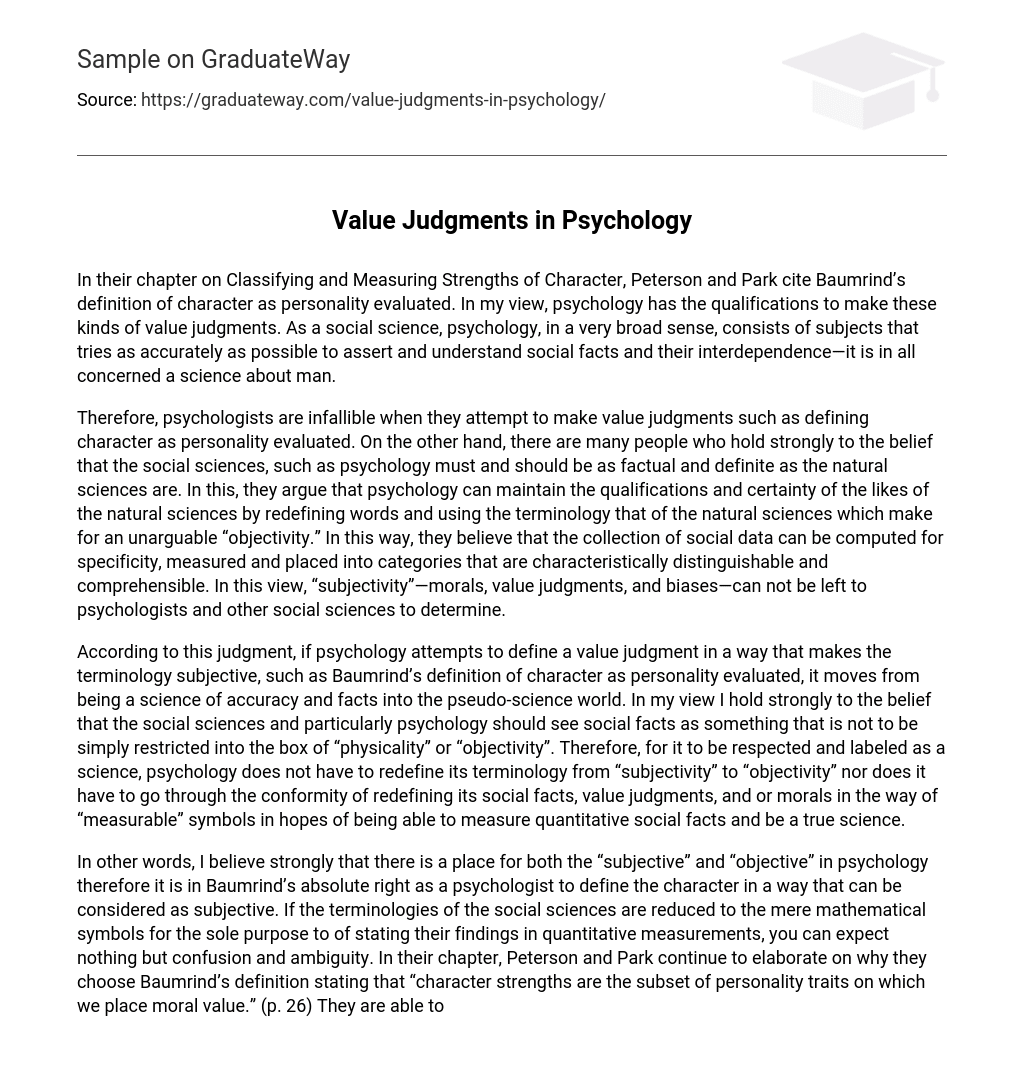In their chapter on Classifying and Measuring Strengths of Character, Peterson and Park cite Baumrind’s definition of character as personality evaluated. In my view, psychology has the qualifications to make these kinds of value judgments. As a social science, psychology, in a very broad sense, consists of subjects that tries as accurately as possible to assert and understand social facts and their interdependence—it is in all concerned a science about man.
Therefore, psychologists are infallible when they attempt to make value judgments such as defining character as personality evaluated. On the other hand, there are many people who hold strongly to the belief that the social sciences, such as psychology must and should be as factual and definite as the natural sciences are. In this, they argue that psychology can maintain the qualifications and certainty of the likes of the natural sciences by redefining words and using the terminology that of the natural sciences which make for an unarguable “objectivity.” In this way, they believe that the collection of social data can be computed for specificity, measured and placed into categories that are characteristically distinguishable and comprehensible. In this view, “subjectivity”—morals, value judgments, and biases—can not be left to psychologists and other social sciences to determine.
According to this judgment, if psychology attempts to define a value judgment in a way that makes the terminology subjective, such as Baumrind’s definition of character as personality evaluated, it moves from being a science of accuracy and facts into the pseudo-science world. In my view I hold strongly to the belief that the social sciences and particularly psychology should see social facts as something that is not to be simply restricted into the box of “physicality” or “objectivity”. Therefore, for it to be respected and labeled as a science, psychology does not have to redefine its terminology from “subjectivity” to “objectivity” nor does it have to go through the conformity of redefining its social facts, value judgments, and or morals in the way of “measurable” symbols in hopes of being able to measure quantitative social facts and be a true science.
In other words, I believe strongly that there is a place for both the “subjective” and “objective” in psychology therefore it is in Baumrind’s absolute right as a psychologist to define the character in a way that can be considered as subjective. If the terminologies of the social sciences are reduced to the mere mathematical symbols for the sole purpose to of stating their findings in quantitative measurements, you can expect nothing but confusion and ambiguity. In their chapter, Peterson and Park continue to elaborate on why they choose Baumrind’s definition stating that “character strengths are the subset of personality traits on which we place moral value.” (p. 26) They are able to back up their reasoning on choosing this particular definition and to attempt to limit their terminology as something subjective and not factual statements is to dismiss their research and conclusion as pseudo-science. To be able to defend psychology’s attempt to make value judgments we must understand what value judgments are. In the broad sense, they are not simply centered on the idea of something having value or worth but rather value judgments are focused on creating a course of action with the goal of taking an incomplete situation and bringing it into realization.
Given this understanding, the old connotation that value judgments are all emotional biases and prejudicial ideology seems to be a rather naïve understanding of the phrase. Value judgments are brought to the formation from the critical analysis of an individual’s own set of held values. The merit and truth that Baumrind’s value judgment holds gives rise to logical valuation due to the fact that reason played a key role in selecting that specific definition of character. Therefore, it is an open ground for psychologists to make other value judgments.





